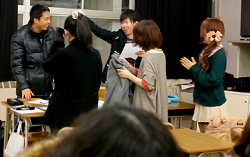Group-learning in Japan
Although group-learning methods are rare in contemporary Japanese college classrooms, Shuji Sugie (1999) pointed out that group-learning methods once served as a foundation of teaching practice in Japanese education. Sugie argued that Japanese educators should return to group learning methods because collaboration is "essential in the process of learning by human beings" and can create "an environment where [students] can develop their individuality" (p. 46). Researchers at Showa University provided support for Sugie's vision when they found that collaborative techniques proved "very effective" for improving scores, skills, and satisfaction" among graduate pharmacology students (Saito, Kogo, Sasaki, Sato, Kiuchi, & Yamamoto, 2007, p. 103).
Professor Yoichiro Miki said that team-based learning helps Kochi University students become more interested in physics teamwork. "Students can develop factual knowledge through lectures; but, working with teams helps them know how to treat phenomena using the scientific and collaborative methods they would use in practice" (personal email, October 29, 2011).
Saga University and Tokyo Women's Medical University also implement team-based learning to help students develop collaborative skills that translate into professional success.
In other words, even though the contemporary Japanese education culture is entirely lecture-based, some universities around Japan find that Japanese students can improve individual performance and satisfaction by collaborating to learn with other students.





![Your brain can keep growing, adapting, and learning at any age, if you are willing to put in the effort [Image: Copilot]](/images/Images/best-years-for-adult-brain300.png)
